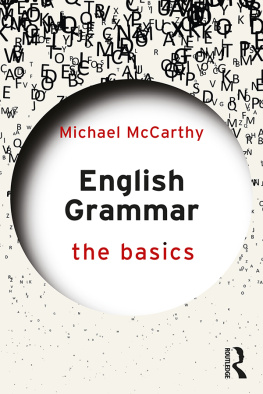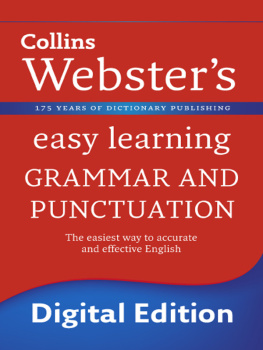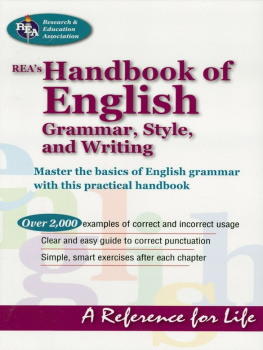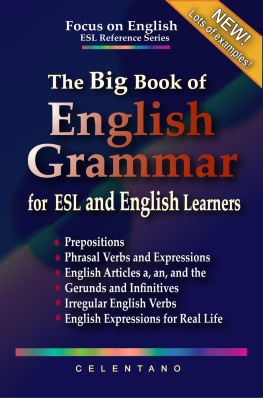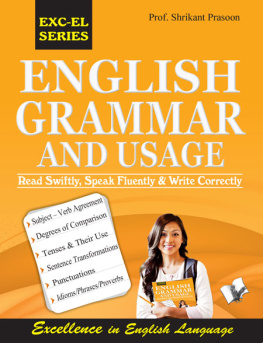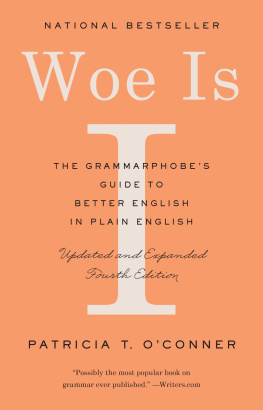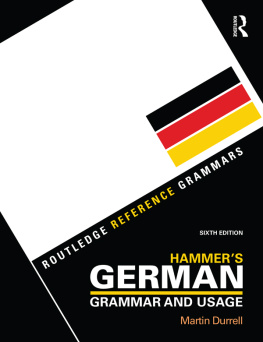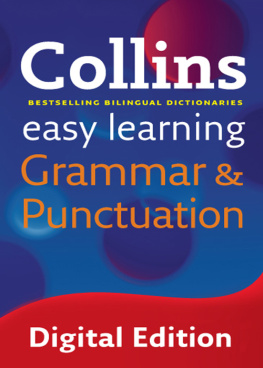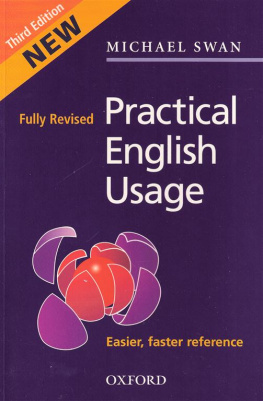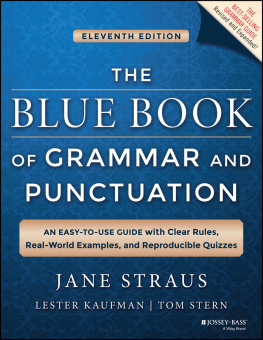Grammar and Usage: Your Questions Answered
A new and updated version of English Grammar: Your Questions Answered (by the same author)
Michael McCarthy
Cover illustration by tebbitdesign
http://tebbitdesign.co.uk/
Prolinguam Publishing 2019
Prolinguam Publishing
7 CB23 2RW
UK
Copyright Michael McCarthy 2019
All rights reserved
Please respect this copyright. No part of this publication may be reproduced, stored in a retrieval system or transmitted in any form or by any means without the prior written permission of the copyright holder, except for short quotations for the purposes of review.
Contents
WHO IS THIS BOOK FOR?
The book is primarily designed for people whose native or first language is the English of Britain and Ireland but who have occasional doubts about what is considered correct and what is not correct in grammar and usage. Its not specifically designed for language learners, but if youre an expert non-native user of English, you might find it useful. If you speak another variety of English (e.g. American, Nigerian, Australian, Indian) you should find that most, but not all, of what is included in this book corresponds with the standard conventions of your variety.
This is not a complete manual of English. Nor is it one of those well-intentioned books that bog you down in differences between gerunds and gerundives. It focuses instead on the problems that users of English often encounter concerning the best choice of words and grammar to suit their purpose.
Shakespeare famously used a number of what we now call double comparatives and double superlatives such as more hotter , more worse and most bravest. These have fallen out of usage and are now considered bad grammar. Good grammar changes over time and all this book is trying to do is to help you to feel comfortable with what is widely accepted as standard usage at this time. Things are not always 100% clear-cut, so be prepared to go away with decisions to make and something to think about, rather than always being dished up truths and certainties, which are likely to turn out to be untruths and uncertainties or, if they arent already, may well be so a couple of years from now.
Sometimes Ill be strict and conventional and say that something is standard or non-standard when the evidence clearly comes down heavily and unambiguously on one side or another. But the scales dont always fall decisively in one direction or another. Therefore, sometimes times Ill invite you to make your own choice, or say it doesnt really matter because two or more acceptable ways of saying something are in widespread and common use. Often, the choices you have to make will depend on the situation, whether formal or informal, written or spoken.
Here and there I mention what grammarians of former centuries have said. This is not to impress you that I am a brainy professor. It is simply to show how things change, how some aspects of grammar have been debated for centuries, and how the rules of grammar handed down through the generations have their origins in classically-dominated scholarship and in particular social and political environments.
Academics are notorious for fudging and hedging, but Ill try to keep that to a minimum. In the end, you must decide what to say or write.
HOW TO USE THIS BOOK
You can just read it from cover to cover if you wish and if youve got the time. Theres a table of contents at the beginning of the book and the whole book is organized A-Z with cross-references, so you have various ways into it.
THIS NEW EDITION
The first edition of this book only had grammar in the title, using the word grammar in a very broad sense of the rules and conventions of usage in English. Since this may have suggested a narrower account of only the rules of inflexion and word-order, I have included the word usage in the title of the new edition. I have tried to make the new edition more concise, with less detail and fewer asides. This edition also contains some more recent observations of changes in grammar and usage recorded over the last two years. Grammar and usage have always changed, but relatively slowly in comparison to the introduction of new words and fads and fashions in vocabulary and pronunciation. However, with the increasing globalization of all the media (press, broadcasting and social media), American English influences have become stronger on British English, and other influences from outside the traditionally dominant British and American models of English usage are increasingly apparent.
ABOUT THE AUTHOR
Michael McCarthy was born and grew up in Cardiff. He studied at Downing College, Cambridge from 1966 to 1973, where he received his MA and PhD. He later trained to be an English teacher at the University of Leeds.
He is Emeritus Professor of Applied Linguistics in the School of English, University of Nottingham, UK. He has also served as Visiting Professor in Applied Linguistics at the University of Limerick, Ireland, and Newcastle University, UK, and as Adjunct Professor at Penn State University, USA. He holds an Honorary Professorship at the University of Valencia, Spain. For the last 30 years, he has worked with large, computerised corpora of English texts, investigating them to establish how the vocabulary and grammar of English are used at the present time and how they are evolving and changing.
He is author/co-author of more than 50 books and over 100 academic papers dealing with the description and teaching of the English language, especially as a second or foreign language and with a focus on the spoken language. He has taught in Britain, The Netherlands, Spain, Sweden and Malaysia. He is co-author of the 900-page Cambridge Grammar of English , Grammar for Business , English Grammar Today and the globally successful Touchstone and Viewpoint courses for adult learners of English (all published by Cambridge University Press).
He has lectured in 46 countries on aspects of English and English teaching and has spoken about grammar in radio and TV interviews in different parts of the world.
GRAMMAR AND USAGE A-Z
ACCOMMODATION
Note the spelling: -cc- -mm-. Traditionally, British English treats this as a mass (uncountable) noun, so it is not used in the plural.
They have some wonderful accommodation for students on campus these days, not like when I was at university.
However, American English has long been happy with plural accommodations in sentences like the above and youll occasionally see and hear it in British English too.
ADVERBS (WELL, SUDDENLY)
Convention has it that most adverbs end in -ly , though some everyday adverbs dont ( well, fast, better, worse, hard [as in work hard ], inside , etc.). The following are non-standard:
It all happened very sudden . (= suddenly )
She did really good in her exams. (= well )
Norman Blakes 2004 book, Shakespeares Non-Standard English , has a long list of adjectives used as adverbs (e.g. thou didst it excellent [modern usage: excellently ], from Taming of the Shrew ).
I grew up in South Wales, where adverbs without - ly were considered as normal as being able to sing in harmony. Our national poet, Dylan Thomas, famously referred to the boys dreaming wicked in his immortal Under Milk Wood .
See HARDLY AND HARD, RIGHT(LY), WRONG(LY), TIGHT(LY)
AFFECT or EFFECT
Affect is a verb meaning to influence someone or something.
Solar flares can affect radio communications on earth.


